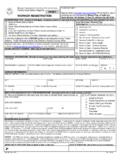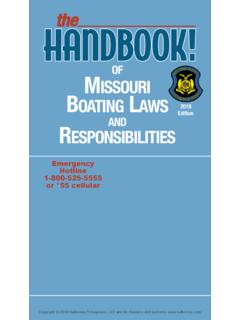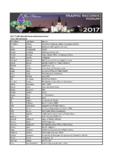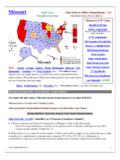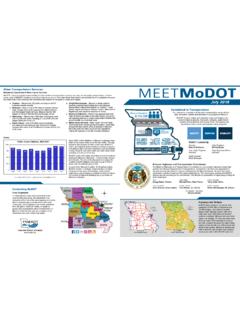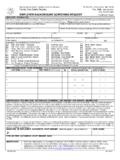Transcription of EIGHTH CIRCUIT GRANTS IMMUNITY TO TROOPER …
1 ---------------------------------------- ---------------------------------------- ---------------------------------------- --------------- 2018 Article published in the free LLRMI E-Newsletter Link to article online: | EIGHTH CIRCUIT GRANTS IMMUNITY TO TROOPER WHO ARRESTED PROTESTER March 2018 For duplication & redistribution of this article, please contact Law Enforcement Risk Management Group by phone at 317-386-8325. Law Enforcement Risk Management Group, 700 N.
2 Carr Rd. #595, Plainfield, IN 46168 _____ Article Source: 2018 Brian S. Batterton, , Legal & Liability Risk Management Institute On October 17, 2017, the EIGHTH CIRCUIT Court of Appeals decided Weed v. Jenkins et , which serves as an excellent explanation regarding liability for arresting a protester for failing to disperse at a protest. The relevant facts of Weed, taken directly from the case, are as follows: On Saturday, August 17, 2013, Weed and others held signs protesting the President's policies, from a pedestrian sidewalk on an overpass over Interstate 70 in St.
3 Charles, Missouri. Protesters faced the highway below, targeting motorists. Traffic that day was more congested than usual. The highway's left lane was closed for construction. A festival taking place nearby was accessible by the next exit. At that exit, there was construction for traffic leaving the highway. The traffic approaching the protest was heavy and intermittently congested, backing up to the next exit. That day there were five accidents on the stretch of highway approaching the protestors. One occurred before they arrived.
4 A Missouri Department of Transportation worker told the investigating officer that the protesters were causing a traffic safety hazard. Investigating the second accident, a state TROOPER "observed drivers making evasive maneuvers and honking their horns in response to protesters standing on [the] overpass above." The driver in the third accident told the investigating TROOPER "he was distracted by protesters above on the overpass, and that the crash would not have occurred if the protesters had not been there.
5 " A driver and passenger in the fourth accident said that "the crash occurred because too many people were looking up at the protesters and not paying attention to the road." The TROOPER investigating that accident "was almost struck by a car that swerved to avoid hitting another car" and "observed numerous vehicles change lanes when it was unsafe to do so, drivers slam on their brakes, and vehicles run off the road into the grass to avoid collisions." The driver and passenger of the car hit in the fifth accident also said the protesters were distracting.
6 ---------------------------------------- ---------------------------------------- ---------------------------------------- --------------- 2018 Article published in the free LLRMI E-Newsletter Link to article online: | Corporal Jenkins the highest-ranking officer from the Missouri State Highway Patrol (MSHP) that day was responsible to decide whether to ask the protesters to leave. The troopers who investigated the accidents told Jenkins that the protesters were creating a traffic safety hazard, causing or contributing to the accidents.
7 After the third accident, Jenkins was not personally convinced that the protesters were causing or contributing to the accidents and decided to take a "wait and see" approach. Jenkins went to assist at the scene of the fifth accident. He noted that traffic was heavier than earlier that day. The TROOPER who had investigated the fourth and fifth accidents told him she had observed unsafe driving, had almost been hit, and that the motorists in the accidents thought the protesters were the cause.
8 Jenkins had also been told that "numerous persons had called the MSHP and reported the protesters were causing a distraction." Jenkins determined "that the protesters were creating a traffic hazard and causing or contributing to traffic accidents." He decided they should be removed from the overpass. After the St. Charles police refused to remove them, Jenkins sent MSHP officers to the overpass. When Jenkins arrived, most of the protesters were already dispersing, but Weed and another protester were arguing with two other officers.
9 The officers explained several times why they were asking them to leave the overpass and said they could return another time. Weed maintained he had a right to be on the overpass and believed that because he had only been "asked" to leave, he had no obligation to do so. Jenkins asked Weed whether he was going to leave and said that if he did not, he would be arrested. Weed refused to leave. Jenkins arrested him for willfully opposing a member of the highway patrol in violation of RSMo. A week later, Weed returned to the same overpass for another protest.
10 No one was arrested. He has since attended many other overpass Weed subsequently sued the arresting TROOPER , and the Missouri Highway Patrol (MSHP) Superintendent for violating his rights under the First and Fourth Amendment for arresting him under Missouri state law for willfully opposing a member of the highway patrol (see Section RSMo.). This article will not discuss Weed s constitutional challenge of the statute for which he was arrested; however, it is noted that the court upheld the constitutionality of that statute.


